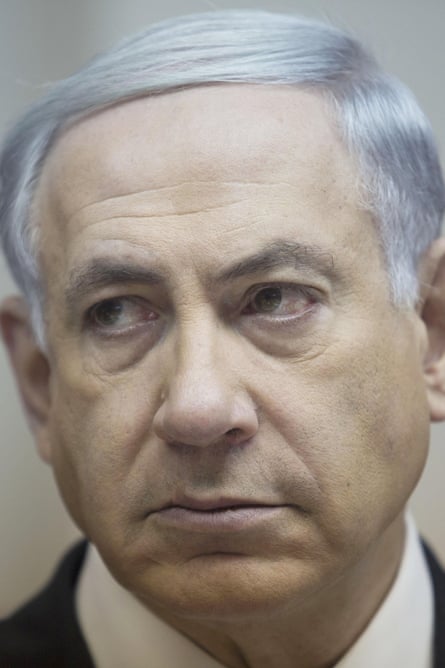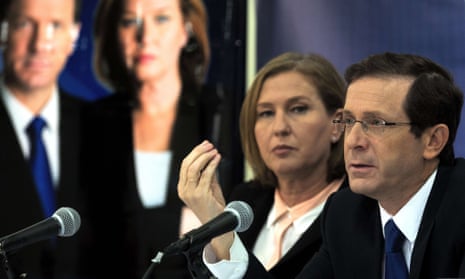Binyamin Netanyahu’s campaign for re-election for a fourth term as Israel’s prime minister appears to be stumbling, with recent polls suggesting he is marginally behind his biggest challenger, Isaac Herzog.
Although headlines have been dominated by Netanyahu, a low-key campaign by the Zionist Union – an electoral alliance between Labor, led by Herzog, and the former justice minister Tzipi Livni – has seen it running neck and neck with Netanyahu’s Likud or leading by a handful of seats.
With less than three weeks to go until Israelis vote on 17 March, an increasingly confident Herzog has said he intends to target wavering “soft Likud” voters in the runup to polling day.
After calling a snap election in December, Netanyahu began the campaign as favourite. But in recent weeks he has struggled to make headway amid a mounting sense of anxiety in his election team, which is aware that opinion polls in the last two elections have over-estimated Likud’s results.
In a campaign that many see as a referendum on Netanyahu, Herzog, 54, has appeared determined to avoid handing any ammunition to his rival while pitching his appeal to Israel’s centre.
The son of Chaim Herzog, Israel’s sixth president, and the grandson of Yitzhak Halevi Herzog, Israel’s first chief rabbi, Herzog – like Netanyahu – studied in the US before returning to Israel to serve as a signals intelligence major in the army’s elite Unit 8200.
The electoral arithmetic of an increasingly right-leaning Israel suggests that Netanyahu should more easily be able form a coalition after the election. But the enmities fostered by the incumbent prime minister among some of his natural allies have seen Herzog emerge as the de facto leader of the “anyone but Bibi” camp – referring to Netanyahu’s nickname.
“I intend to win, and I will win, and I will be the next prime minister of Israel. I will replace Netanyahu,” Herzog told foreign correspondents this week.
“People didn’t give me a chance when I ran for the leadership of Labor. I won a landslide,” he said. “I am telling you seriously I have all the options of forming a coalition.”
In many respects Herzog is the antithesis of Netanyahu, with an understated and careful lawyerly delivery in contrast to Netanyahu’s gimmicks, rhetorical flourishes and hyperbole.
Herzog’s manifesto too appears to have been crafted to bring in as many Israelis under his umbrella as possible rather than leave any hostages to fortune – not least after a virulent attack ad launched by Likud suggested that a vote for Herzog and Livni could bring Islamic State to Jerusalem.
He promises to reverse the country’s drift towards international isolation. On the Palestinian peace process he says he will wait until after the election to see where the Palestinian leadership stands, vowing, meanwhile, to protect Israeli soldiers from being brought before the international criminal court.
On settlement building – a key issue for the US and the EU – his position is similarly nuanced: a freeze, but outside the large settlement blocs. Regarding Iran’s nuclear programme he differs with Netanyahu only in approach, condemning the prime minister’s actions in undermining US-Israeli ties with his planned speech before Congress next week.
In recent days Herzog has also reached out to the ultra-orthodox figures he might need for a coalition, attending the wedding of the granddaughter of the chairman of United Torah Judaism, Ya’acov Litzman.

Where Herzog and his party have carved out a sharp difference with Netanyahu, however, is on social and economic issues, regarded as the key preoccupations of the Israeli electorate.
Prominent in his party’s list are two key leaders of Israel’s social protest movement from 2011. His choice to deal with Israel’s economic problems is the highly respected economist Manuel Trajtenberg, and he has vowed to tackle affordable housing and the cost of living, issues on which Netanyahu has largely been silent.
But despite Netanyahu’s lacklustre showing, most agree that Herzog too will have a substantial hill to climb, not least in overcoming the long-running reluctance of the Israeli electorate to return a prime minister from the Labor party.
If something has changed, however, in recent weeks, it is the fatalistic attitude of many Israelis who had resigned themselves to another Netanyahu administration.
“I think the big question in the Israeli public’s mind is regarding Herzog’s experience,” says Tal Schneider, a prominent political journalist and blogger at the Plog, who believes Herzog is benefiting from dissatisfaction with Netanyahu across the political spectrum.
“We have an open field compared with the last couple of years where it seemed there wasn’t even going to be a race.
“I know Herzog in person. He is probably one of the most likable personas [in Israeli politics]. Despite being born into a very rich and well-connected family he is very easy to connect with on a personal level. Herzog was also a good opposition leader, far better than Livni, and was able to get different groups like the Arabs and haredim [ultra-orthodox Jews] to sit together.
“Now Herzog is gaining in the polls, and I think that is because of a vacuum of leadership. You don’t see any big figures on the right standing up to Netanyahu. The only missing part in Herzog puzzle is over his [political] charisma. People will forget about that if he wins.”
Political scientist Gideon Rahat agrees with Schneider that the race is now open with the next government most likely to be decided by a “kingmaker”, such as former Likud minister Moshe Kahlon, who is now leading his own party.
“Netanyahu has relied on being the default candidate,” says Rahat. “He’s the incumbent. That’s the source of his power. But he’s not manoeuvring well or employing a good strategy. He’s enjoying being the only one who has experience, but he is not popular.”
“Herzog is a pragmatic Labor politician. He’s trying to get votes from centre. And I can see a scenario where he might become prime minister – although if I had to bet I would still say Bibi.
“But there will be a lot of luck involved. A lot of people will decide in the last four days when you are not allowed to publish opinion polls. And that’s when some dramas may happen.”
